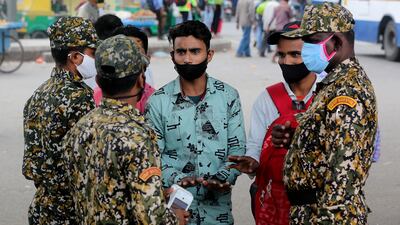Authorities in the Indian city of Mumbai have set up “war rooms” to monitor potential carriers of the highly infectious Omicron variant, after the country reported two more cases on Saturday and police launched a manhunt for missing suspected cases.
India's third and fourth cases of the Omicron strain were reported in the western states of Maharashtra and Gujarat.
Officials in Mumbai said a male passenger who arrived in the city from South Africa via New Delhi last week had tested positive for the new strain.
The case in Gujarat is a 72-year-old man who travelled from Zimbabwe on Thursday.
Authorities have tracked all their contacts and are monitoring their health, officials said.
The Omicron variant has been detected in about 40 countries since it was first reported in South Africa last month.
Mumbai – the Indian city hit worst by the Covid-19 pandemic – launched the war rooms in each of its districts, or wards, to keep a check on hundreds of travellers from “at risk” countries as they undergo mandatory home quarantine.
Officials are making visits to monitor their health and calling them several times a day to ensure that they remain isolated. Those who breach quarantine measures will face criminal charges.
deputy mayor
“Mumbai has a high density of population and is very crowded. We can’t take any risks. We have to be very cautious,” deputy mayor Suhas Chandrakant Wadkar told The National.
“We have decided to restart the ward war rooms so we can monitor those in quarantine. The war room staff will make calls every two hours to these travellers, five times a day. If they need anything they can inform us,” he said.
Mumbai recorded nearly 7.6 million cases and 16,000 deaths since the pandemic hit the country in January 2020. Infection rates have dropped in recent months, with health officials reporting 68 new Covid-19 cases on Saturday.
But the emerging threat of the new strain prompted authorities to strengthen precautions.
India recently tightened its rules for all international arrivals and made testing and home quarantine mandatory for passengers from countries where the new strain has been detected.
More than 20,000 passengers have been tested across dozens of airports since the new rules came into effect on Wednesday.
Omicron response around the world
In Maharashtra state, of which Mumbai is the capital, at least 288 samples from travellers have been sent for genome sequencing to check for the presence of the Omicron variant.
More than 12 Covid-19 cases were admitted to a government hospital in Delhi as authorities await the results of tests for Omicron. Another dozen cases were being monitored in northern Chandigarh city.
Mumbai's stringent monitoring system comes after nearly two dozen suspected cases, including travellers from South Africa and Botswana, dodged quarantine in northern Uttar Pradesh and southern Karnataka states by furnishing incorrect addresses and disappearing after their arrival at the airports.
India reported its first two cases of Omicron in Karnataka’s Bengaluru city on Thursday - a vaccinated doctor with no travel history and a South African national with a negative Covid-19 report.

The detection of Omicron cases has caused alarm across the country, with authorities urging people to follow rules on wearing face masks and to avoid crowded places.
The government has also asked the states to increase testing and vaccinations to curb the spread of the new strain, which is believed to be more infectious than the Delta strain that ripped through the country during the second wave in April-May.
The health ministry on Saturday wrote to six states where weekly infection rates have been rising, including Karnataka, Kerala and Tamil Nadu in the south, to step up their “Test-Track-Treat-Vaccinate" strategy to control the spread of the virus and reduce deaths.
Experts, however, say that the government is “overreacting” to the situation and should avoid pressing the alarm button as a majority in the country are covered by a hybrid protection of herd immunity and vaccination.
“For a setting like India where there is a high vaccine coverage and seroprevalence (percentage of people in a population who have antibodies in their blood), the impact of the new variant is likely to be very minor so we should not be overreacting to finding a case,” Chandrakant Lahariya, an independent Delhi-based virologist, told The National.
He said the government should instead focus on increasing vaccinations, which help reduce severe disease, admissions to hospital and deaths.
“An individual who gets vaccinated can still get infected with Omicron but the impact would be less for all of the variants and that’s why people should be vaccinated,” he said.











